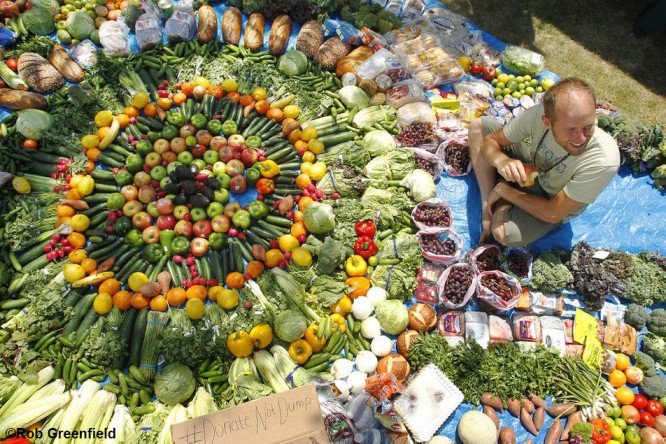Over the past decade I’ve volunteered at various food rescue charities. Such charities receive unsold food donations from shops or restaurants, and redistribute it to food banks or shelters. Whilst this is a mutually beneficial and efficient way to eliminate waste, it also lulls you into a false sense of security that the problem of food waste has been addressed. Working with food rescue allows you a good understanding of how much food is being donated, but you’re still utterly in the dark about how much food is still being thrown away.
Trevor, a former supermarket employee, describes costing out and throwing away food:
“This was a very sad part of the job. Everyday, large garbage bins full of food were put outside in a locked area to be picked up for disposal. Employees were not allowed to have any of it. Eggs were a particularly frustrating product – if one egg in a carton cracks, the whole dozen gets thrown out. It broke my heart knowing that people in the community were struggling to get enough food and yet so much was getting thrown out each day.”

When I started dumpster-diving, and realised how much food is wasted, I realised – food is not trashed because it’s spoilt. It’s trashed because the concept of a supermarket is predicated on the idea that it can supply everything you need, all the time, all under one roof. This means that supermarkets must constantly be over-supplied in order to guarantee freshness and demand, which creates a massive waste margin. So each week, huge truckloads of fresh produce comes in, and everything unsold from the previous week gets trashed to make room for the new produce.
Items such as fruits, veggies, eggs and milk are often wasted because of their short shelf life. But products are also thrown out simply because they don’t sell. Sometimes because they’re niche products, usually because they’re ridiculously overpriced. Anything paleo, gluten-free, vegan or organic has a pretty good chance of getting binned by mainstream commercial supermarkets who aren’t catering for that particular clientele.

The quality and quantity of waste is offensive, not just from a food justice perspective, but also from a commercial perspective. Each and every food item wasted represents someone’s hard work and toil. Farmers are up at the crack of dawn and work until sundown to grow and harvest these crops whilst facing constant pressure from supermarket chains to lower their prices. If the supermarket chains insist so aggressively that pricing needs to remain competitive, perhaps a better way to achieve this is to re-examine their internal supply-and-demand chain instead of squeezing profits from their primary suppliers. Farmers should not be expected to carry the burden of affordable produce alone.
Supermarkets provide a valuable essential service to millions of Canadians of all economic backgrounds, not to mention millions of jobs. They are an important part of our economy and our daily life. But as consumers become increasingly interested in the ethics of the businesses they support, supermarkets should do well to pay attention if they wish to remain commercially competitive.
It’s time to acknowledge that we can do better.




Discussion
There must be a way that all this food that is thrown be made available to those in need. It must be so frustrating. For the hardworking growers, distributors, farm workers to see all of their incredibly hard work go to waste. Please make this good food available to those in need.
I also would like to remind our well fed society to respect the food we buy and to avoid over buying and wasting food on an every day or every week basis. I see fridges and freezers over flowing with food that families/single person can’t eat even if they cooked every day. I also know of individuals who don’t believe in left overs. A lot of education needs to be done in that regard as well.
Have long anguished for years over the food waste I know is happening In West Vancouver specifically, and everywhere by extension, and I have tried to address the problem with various super market managers. To no avail. Petition signing isn't going to change things. I believe that we need to subscribe to a massive profit-oriented system change that we need to be addressing now. That is what I will add my voice to.
The most vulnerable people in our society are the poor. That includes our elderly, children,those of impaired mind &/or body,etc. Without access to so much already why are you allowing unsold food go to waste when it is so desperately needed? Please help amend this travesty of waste!!!
It is hugely unethical and obscene that all this waste is built into the pricing at Supermarkets. Good luck with your push for a better system. Pam Dawes, Sydney, Australia
In the late '80s I worked at a grocery store in Ottawa in the bakery department. I volunteered to take all of the products that would go to waste( pasties and cakes etc) and drop it off at the shelter as i drove home. The manager agreed to let me do this and trusted me not to take any of it for myself. I was able to continue to do this for almost a year when a new manager came to the store and forbade it. I find that food waste has become and even greater problem than it was 30 years ago. It needs to stop!
Love your story about Dumpster Diving! My city, Calgary, Canada, has a great organization that sends volunteers to pick up from local bakeries and organic markets food that is still usable but has a recent "Best Before' date on the product. Food is donated to different shelters and offered to 'street people' under supervision, of course. This organization has flourished for 10 yrs - I volunteered with my Jeep to pick up and deliver for 3 yrs. It was a very rewarding experience!
It's really alarming and sad how much of food produced that eventually go to waste, deliberately or not. I support GreenPeace initiative and really desire to start such movement; campaign against food waste in Nigeria. Food production isn't the only solution to food insecurity, we need to curb food waste!
I've been hungry for 3 days I don't have to money for food please don't throw food out
Can you please help feed the hungry by not throwing away perfectly edible food?
Bu zorlu gunlerde birde gıda krizi olursa dünyanın sonu olabilir lütfen tüm dünya devletleri bir an önce önlem alın
I worked in the bakery department of one of Loblaws supermarkets and was appalled at all the bread that was thrown out at the end of each day. I offered to deliver it to a nearby food bank at the end of my shift, but the manager flatly refused my offer. I eventually quit my job there because I could no longer be a part of this disgraceful practice.
The reality is that around 50% of food is wasted, food wasted in stores and in homes plus overeating and overweight populations means that food production could be cut by around 70% and every one would still get enough food. If most people with a yard had a vege garden and fruit trees industrial food production could be further cut.